This article was last updated on January 12, 2026
Sales engagement revolves around timing, consistency, and relevance. Reaching out once isn’t enough. Neither is guessing when or how to follow up. The best sales teams rely on structured, repeatable systems to manage every interaction, without losing the human element.
That’s what sales engagement tools are built to do. They centralize communication, automate repetitive outreach, and give reps the context they need to move deals forward.
The result is better productivity and more thoughtful, better-timed engagement at every step of the funnel. If your team is still juggling tools or chasing prospects without a clear system, it’s time to re-evaluate.
This article breaks down exactly what to expect from a modern sales engagement tool and how to choose one that fits your goals. We’ll also compare the top platforms available today, so you can invest with confidence.
How Sales Engagement Tools Drive Revenue
Sales engagement tools solve a coordination problem that slows down most sales teams. Your prospects interact with your company across multiple touchpoints. They visit your website, open emails, attend webinars, and download content.
Traditional CRMs can sometimes track these interactions poorly, causing sales reps to miss crucial buying signals. Sales engagement tools, however, create a unified view of every prospect interaction.
When someone downloads your pricing guide at 2 AM, your rep sees that activity first thing in the morning. When a prospect visits your competitor's page after your demo, your rep knows to follow up differently.
The dashboard becomes your command center for prospect intelligence. Sales reps can:
- Track which emails get opened and when
- See exactly which website pages prospects visit
- Schedule email sequences that trigger based on specific behaviors
- Monitor reply rates and engagement patterns across campaigns
- Access conversation history from every team member
This visibility changes how sales teams operate. Instead of generic follow-ups, they send contextual messages based on actual customer behavior. Instead of wondering when to call, they reach out when engagement signals indicate interest.
The automation handles repetitive tasks while preserving the human touch. Your team focuses on conversations that matter, not administrative busy work.
How To Choose the Right Sales Engagement Tool

Sales engagement tools range from simple email automation to complex revenue orchestration platforms. Before you compare names, it helps to get clear on what matters to your business. Without that clarity, you risk investing in a tool no one ends up using.
Here’s what to prioritize:
- Integration capabilities matter: Your sales engagement tool needs to connect with your CRM, marketing automation platform, and communication tools. Disconnected systems create data silos that defeat the purpose. And if reps need to jump through hoops to use it, adoption will suffer.
- Match the tool to your team: Enterprise platforms with advanced analytics overwhelm small teams. Simple email sequencers limit growing organizations. Choose tools that scale with your current reality.
- Evaluate based on your sales process: If your team relies heavily on phone calls, prioritize tools with robust calling features. If you sell through social media, look for LinkedIn integration and social selling capabilities.
- Weigh value alongside budget: While budget is always a factor, it pays to shift your perspective from "cost" to the "value" a tool delivers. A slightly higher investment may be justified if the tool offers superior features or saves more time, ultimately providing a stronger return on sales.
- Test with real scenarios before committing: Most platforms offer free trials. Use them to run actual campaigns with real prospects. Generic demos hide usability issues that surface during daily use.
- Prioritize tools with strong customer support: When campaigns break or integrations fail, you need responsive help. Check response times and support quality before committing to a sales engagement tool.
Top Sales Engagement Tools for High-Performing Teams
We evaluated dozens of sales engagement platforms based on automation capabilities, user experience, deliverability, and price per value. Below are what we believe represent the best options for different team sizes and sales processes.
Instantly.ai
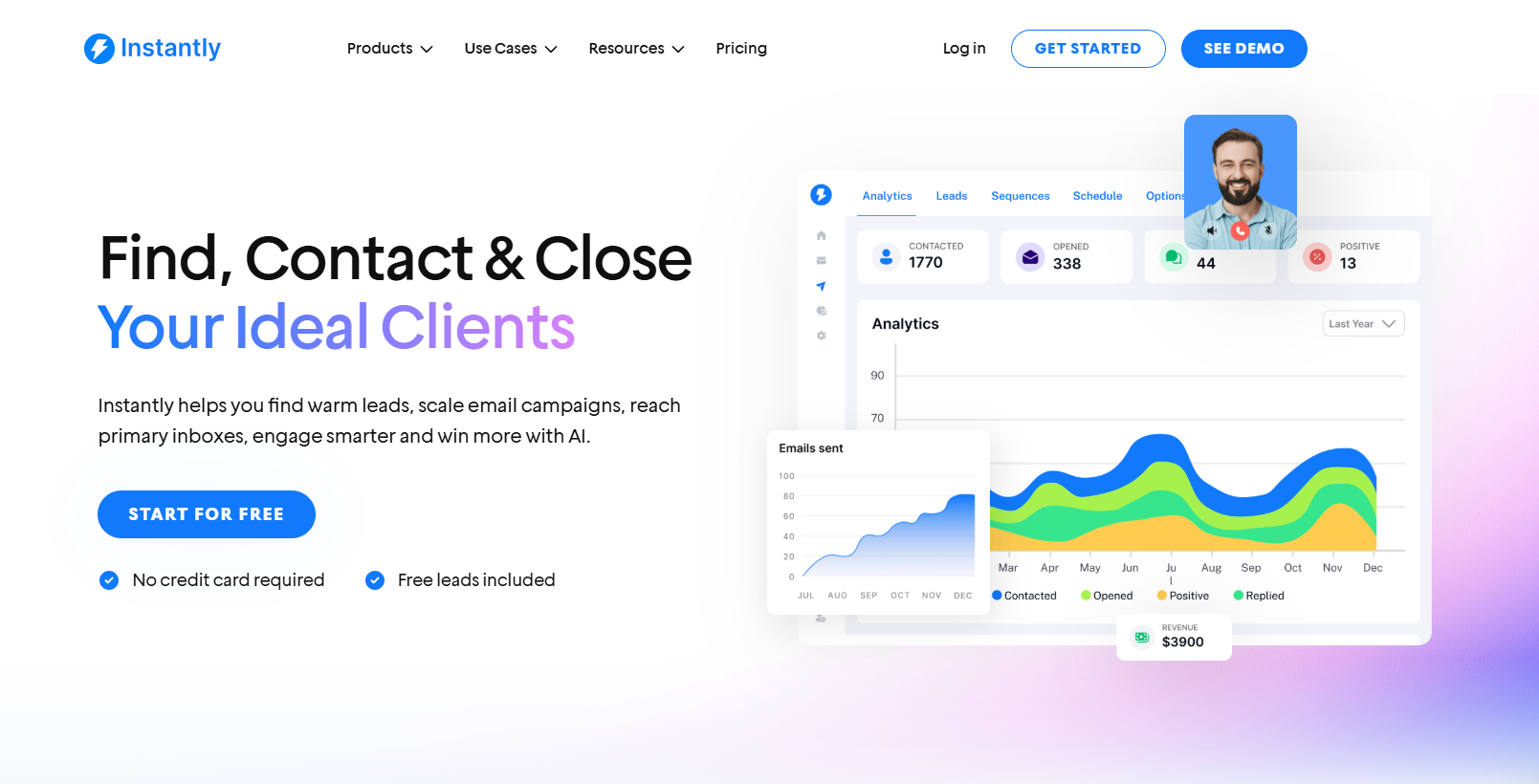
G2 Rating: 4.8/5 ⭐ from 3,715 reviews
Instantly is a purpose-built sales engagement platform that helps revenue teams automate and personalize cold outreach at scale, entirely via email. Designed to eliminate busywork, Instantly provides fast campaign setup and intelligent sequencing for better engagement across the funnel.
One especially appealing feature is Instantly's combination of unlimited email account support and deliverability tooling, even on its entry plan. You can connect as many inboxes as needed, warm them up automatically, and start sending without throttling or risking spam filters.
Campaigns are built using AI-powered email sequences and condition-based subsequences that adapt based on lead status or reply content, so your outreach stays relevant without needing constant oversight.
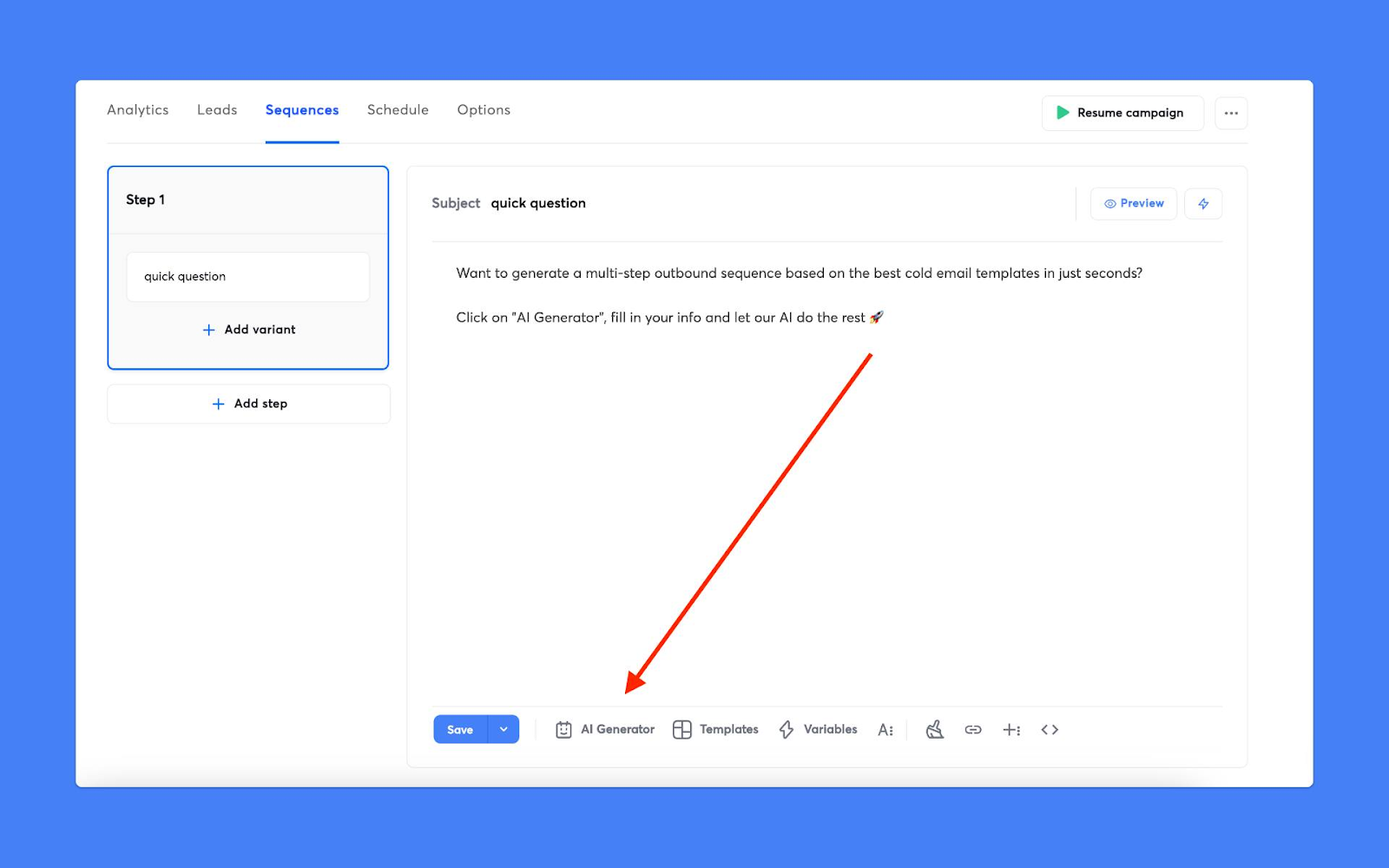
Personalization is handled through smart merge tags. You can customize subject lines, email content, and timing based on prospect data like company size, industry, or previous interactions. The sequencing engine automatically sends follow-ups based on recipient behavior
Campaign performance is measured through a detailed analytics dashboard, giving your team visibility into what’s working and where improvements can be made. Instantly is fast, scalable, and incredibly efficient for cold email teams.
Key Features:
- Unlimited Email Accounts & Warmup: Scale outreach efficiently while maintaining high deliverability across all sender identities.
- Advanced Email Sequencing: Automate multi-stage, behavior-driven follow-up campaigns.
- AI-Powered Personalization & Copilot: Craft highly customized messages and use AI for strategic campaign insights.
- B2B Lead Finder (450M+ Verified Contacts): Find, segment, and export ideal prospects for targeted outreach.
- Comprehensive Analytics Dashboard: Gain deep, actionable insights into campaign performance and engagement metrics.
- Integrated CRM & Unibox: Centralize lead management and communication, streamlining workflows.
- Done-For-You (DFY) Email Accounts & VIP Service: Options for expert setup and managed outreach campaigns.
Pricing:
- Growth ($37/month): Unlimited email accounts & warmup, 1,000 uploaded contacts, 5,000 emails monthly, chat support
- Hypergrowth ($97/month): Unlimited email accounts & warmup, 25,000 uploaded contacts, 100,000 emails monthly, premium live support
- Light Speed ($358/month): Everything in Hypergrowth + 500,000 emails monthly, 100,000 uploaded contacts, SISR system (Server & IP Sharding and Rotation)
Salesforce Sales Cloud
G2 Rating: 4.4/5 ⭐ from 23,344 reviews
Salesforce provides sales engagement solutions across a wide range of industries to businesses of all sizes, with the primary goal of efficiently managing sales leads and advancing them through the sales pipeline.
Sales Cloud also streamlines your campaigns through email automation. Your campaigns connect to their analytics suite, which provides many useful performance insights. Users often find the dashboard intuitive and accessible, even on mobile devices.
Nowadays, Sales Cloud is packed with a robust collection of AI capabilities to deliver a faster, more engaged sales process connected to Salesforce’s own AI.
Key Features:
- Lead and Contact Management
- Opportunity Management
- Email Integration
- Reports and Dashboards
- Mobile Access and Administration
Pricing:
- Free trial available for all tiers.
- Starter: $25/user/month (billed monthly or annually)
- Pro: $80/user/month (billed annually)
- Enterprise: $165/user/month (billed annually)
- Unlimited: $330/user/month (billed annually)
- Agentforce 1 sales: $330/user/month (billed annually)
HubSpot Sales Hub
G2 Rating: 4.4/5 ⭐ from 12,380 reviews
HubSpot Sales Hub is just one arm of the larger business platform that makes up HubSpot. The Sales Hub offers a collection of truly useful tools, each of which is designed to boost sales engagement.
Stand-out features include email tracking, lead management, and meeting scheduling, each of which streamlines your sales process in ways few other platforms can match.
The cherry on top? HubSpot Sales Hub is priced in a way that encourages growth. It’s worth noting that there is a free version of the software, but it is severely limited in comparison to the paid tiers.
Key Features:
- Contact and Lead Management
- Email Tracking
- Meeting Scheduling
- Pipeline Management
Pricing:
- Free tier available
- Starter at $20/month per seat
- Professional at $100/month per seat
- Enterprise at $150/month per seat
ZoomInfo
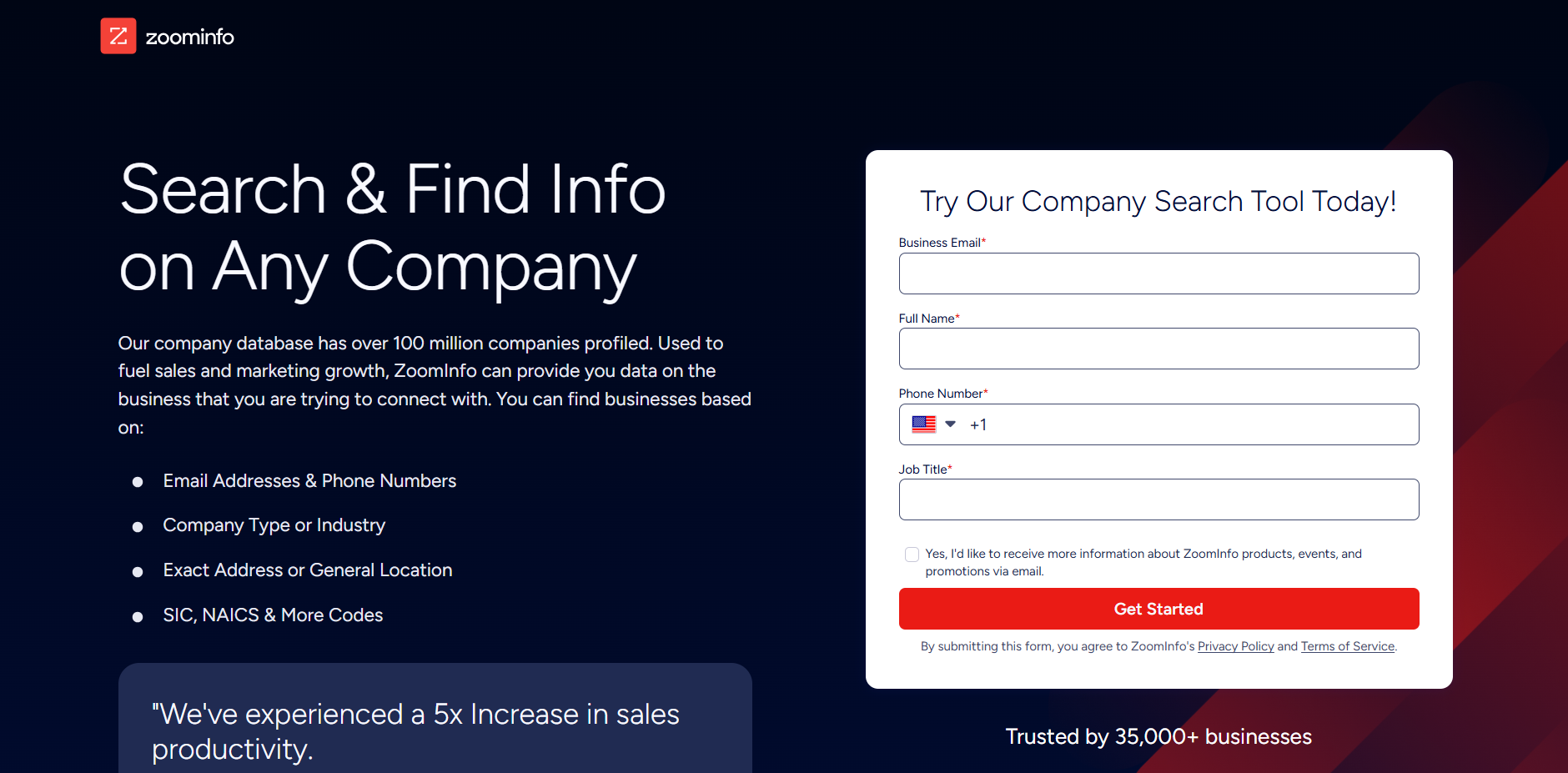
ZoomInfo combines one of the world’s most comprehensive B2B databases with intelligent sales-engagement capabilities, creating a unified platform where data accuracy meets execution. With 100M+ companies, 500M+ contacts, and more than 1B monthly buying signals, ZoomInfo removes the guesswork from prospecting by delivering verified contact data, real-time buyer intent, and automated workflows in one system.
Its GTM Intelligence approach connects data quality with sales execution—helping teams identify high-fit accounts, surface buying signals, and activate multi-channel plays without switching tools. Conversation intelligence and engagement tracking provide visibility across every touchpoint while preserving clean, consistent data across the tech stack.
Key Features:
- Real-time buyer-intent and signal detection
- Verified contact data with direct dials and mobile numbers
- Multi-channel sequencing and engagement automation
- Conversation intelligence and call analytics
- Native CRM integration and continuous data enrichment
- Advanced account scoring and territory management
Apollo.io
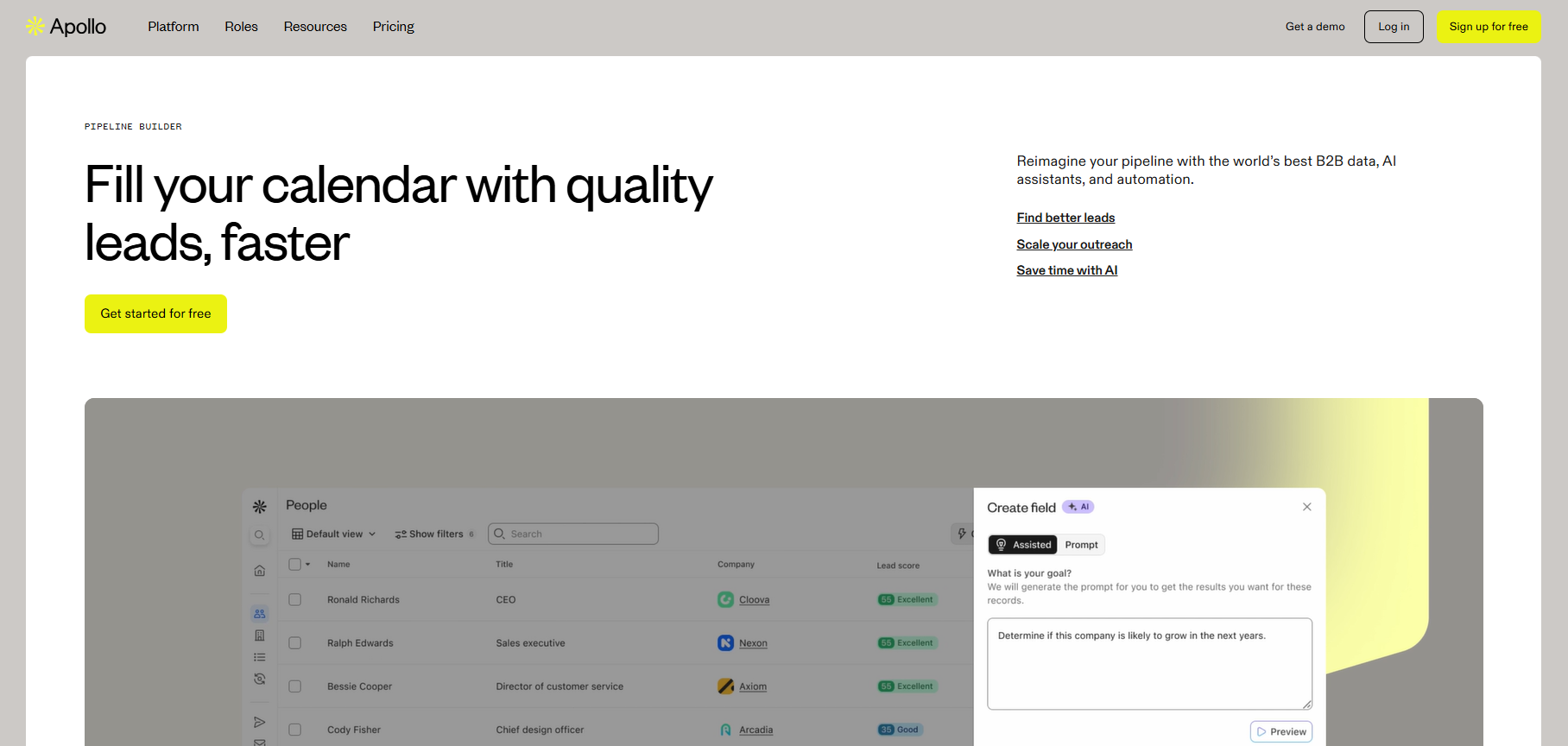
G2 Rating: 4.7/5 ⭐ from 8,838 reviews
Apollo is another widely acclaimed sales engagement tool with a sophisticated set of email marketing and sales tools that help teams engage with their prospects.
Integration with your current email provider should be straightforward. That's thanks to the long list of connections that Apollo offers. Once integrated, you’ll be able to filter emails and leads, manage pipelines, and track important analytics.
At higher pricing tiers, you access the dialer feature. With it, you’re able to make calls to your prospects from within Apollo, making for easy tracking and monitoring. Calls can be recorded, transcriptions taken, plus everything can be logged into the CRM.
Key Features:
- Email Credits
- Sequence Automation
- Buying Intent
- Integration with Email Providers
- Advanced Reports and Dashboards
- Dialer (Professional and Custom plans)
- Customizable Reports (Custom plan)
Pricing:
- Free tier available
- Basic: $59/user/month
- Professional: $99/user/month
- Organization: $149/month (billed annually)
Salesloft
G2 Rating: 4.5/5 ⭐ from 4,144 reviews
Salesloft works by creating what it calls cadences. Cadences are a set of various touchpoints, such as calls and emails, that are made to build engagement with a prospect.
These cadences are all managed from within Salesloft and help teams manage and track activity across the sales process. It’s not the simplest of tools to get to grips with, but the support provided comes highly recommended.
Key Features:
- Sales Email
- Calendaring
- Mobile App Access
- CRM Sync
- Integrations
- Security and Governance
Pricing: There are no publicly listed pricing plans on Salesloft. To access pricing, you must schedule a demo with one of Salesloft’s sales team.
Groove by Clari
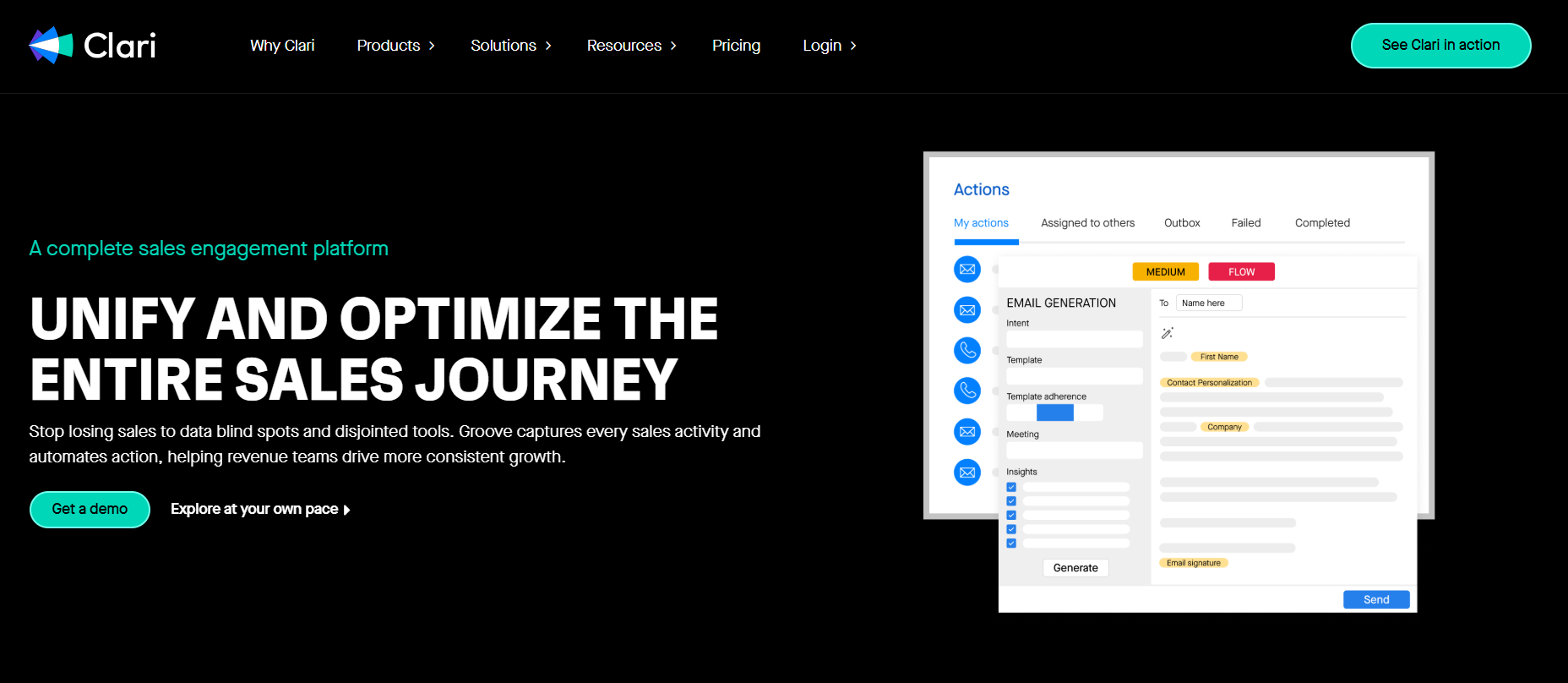
G2 Rating: 4.6/5 ⭐ from 5,461 reviews
Groove is a sales engagement platform that covers a lot of ground. It has features that focus on analytics, productivity, automation, engagement, and financial insight.
If you’re a Salesforce user already, then Groove could be a welcome option as it’s considered the leading sales engagement platform for enterprises using Salesforce.
Groove pulls data from across your network to provide insight into opportunities. It can let your team know when renewals are due, what your team’s next steps should be, and even deliver automated lead engagement.
Key Features:
- Salesforce Integration
- Email and Calendar Integration
- Analytics
- Mobile App
- Customization and Scalability
Pricing: No publicly listed pricing plans. Instead, they offer customized quotes based on the number of users and chosen features. Contact their sales teams for details.
Outreach
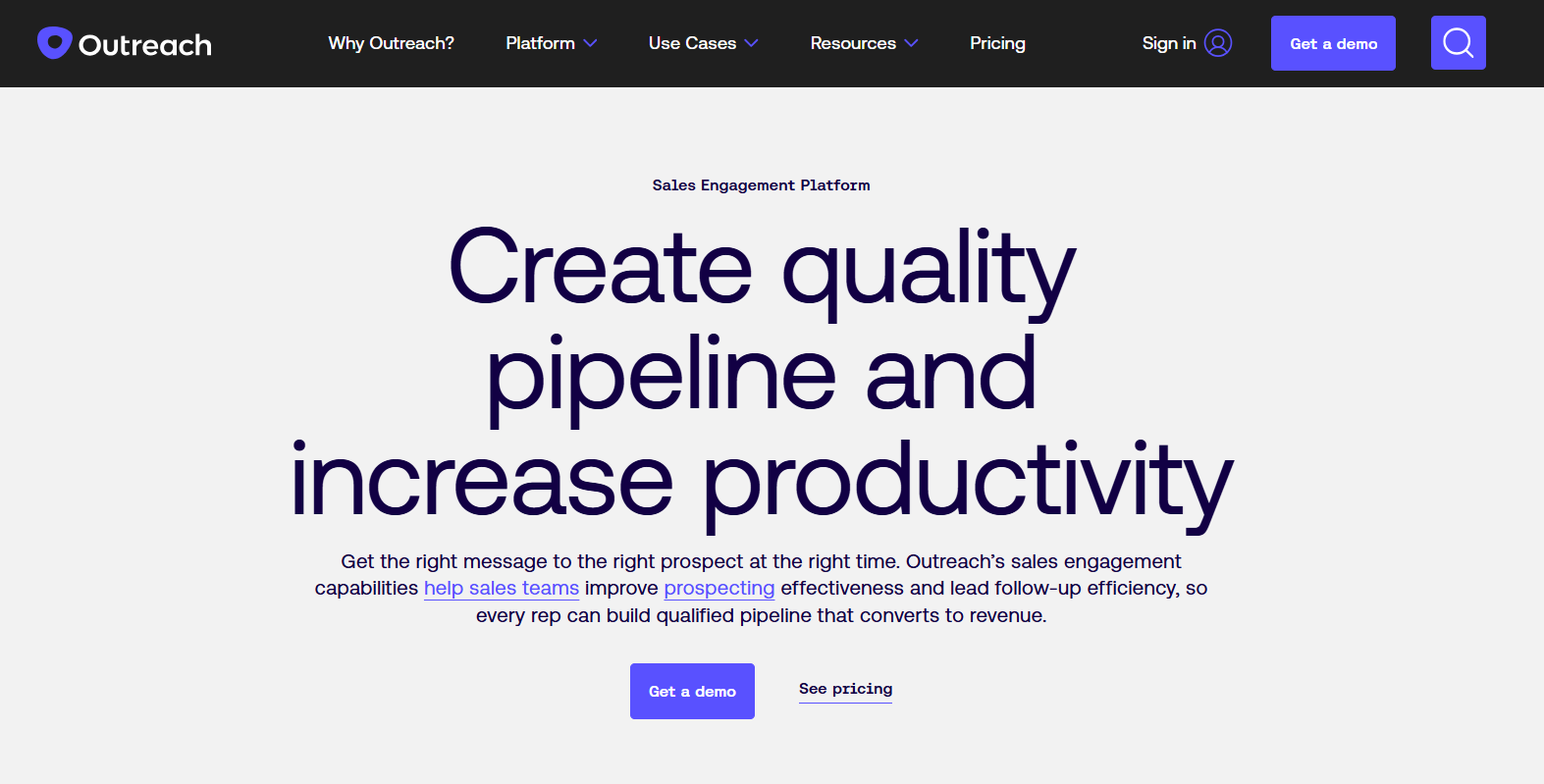
G2 Rating: 4.3/5 ⭐ from 3,479 reviews
Outreach delivers automated email outreach through sequencing. The platform also enables further engagement with prospects by allowing them to book meetings with your sales team themselves.
The tool connects with your prospect database to ensure each set of communication you send is personalized. Some users have recently reported that the new UI is frustrating to use, but when it does function properly, it is a powerful product.
Key Features:
- Sequencing
- A/B Testing
- Outreach Dialer
- Buyer Sentiment Analysis (Optimized License)
- Team Reporting (Optimized License)
Pricing: No publicly listed pricing plans. Contact their sales teams for customized quotes based on your sales engagement needs.
Reply
G2 Rating: 4.6/5 ⭐ from 1,454 reviews
Reply is an AI-first sales engagement platform that includes prospecting. Once prospects are added to the tool, sales teams can engage with them across multiple channels.
Their AI is called Jason, and it is a B2B conversational assistant. This assistant can generate emails for you, build sequences, and even reply to prospects as emails come in.
Reply also integrates with your calendar and booking tools. Meaning prospects can easily book sales meetings and demos. There are a host of other integrations (especially with CRMs), plus endless possibilities when connected to Zapier.
Key Features:
- Multichannel Communication
- Automated Email Sequences
- Salesforce, Pipedrive, and Hubspot Integrations
- Analytics and Reporting
Pricing:
- Email-Only Plan: Starts at $59/user/month. Includes unlimited emails, mailboxes, email warmup, anti-spam tools, and 1,000 active contacts.
- LinkedIn: Add for $69/account/month.
- Calls & SMS: Add for $29/account/month.
- Multichannel Plan: Starts at $99/user/month. Includes all channels, reports, and WhatsApp semi-automation.
- Jason AI SDR: Starts at $500/month. Fully automated AI outreach.
Key Takeaways
Sales engagement tools are foundational to modern sales success. When used well, they give your team the clarity, structure, and support needed to build stronger connections and convert more leads.
The best tools integrate seamlessly into your existing stack. They enable your team, not slow them down. Look for features that align directly with your workflow, your outreach volume, and your sales goals.
Automation and AI are no longer optional. They’re the standard for scale, efficiency, and insight. If you want to reach more prospects, follow up without friction, and analyze what’s working (all while staying personal), Instantly.ai is worth exploring. Start your free trial today and experience the difference.





